Despite the war, there is still an HIV epidemic in Ukraine. According to the national statistics, about 260,000 people are living with HIV, while one third of them are not aware of their status.
For five years, Alliance for Public Health in partnership with 100% Life Network have been implementing the HealthLink Project “Accelerating Ukraine’s Efforts to End HIV” supported by the United States Agency for International Development (USAID). The main aim of this project is to end the HIV epidemic in Ukraine by offering an opportunity of free, rapid and safe HIV testing and treatment. This is the biggest HIV testing project in Ukraine, which is aimed at improving service delivery in health facilities, partner organizations and communities as well as targeted marketing of the key services provided within the project.
The fifth year of the project was the most challenging one, due to the war, occupation of territories, ruined health facilities and constant migration of population. However, the project was able to reach almost all the target indicators:
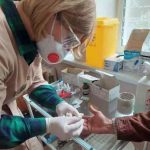 • 59,985 people tested for HIV (157% of the indicator for the year),
• 59,985 people tested for HIV (157% of the indicator for the year),
• 1,991 people with newly diagnosed HIV infection (89%),
• 1,944 people registered at health facilities (80%),
• 1,981 people started ART (98%).
The general HIV testing yield within the project is 3.3%.
Challenging times call for extraordinary solutions, that is why the main efforts were aimed at implementing new ideas to find new clients and motivate them to test for HIV, building sustainable adherence to treatment (ART), motivating partners of PLWH for index testing, preventing new infections by offering PrEP to members of high-risk populations, distributing oral HIV tests, etc. A number of innovative approaches have been implemented, including:
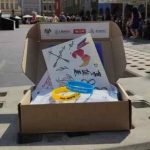 Launch of the Video Doctor app to improve the index testing indicators. Doctors received tablets, which they used during their consultations to show videos to their patients, share useful information about HIV, explain further steps in case of HIV detection and give advice on how to invite a partner for testing. The app was actively used by health and social workers of the project. The videos were shown to 884 clients. The activities were implemented in the following regions: Kyiv and Kyiv region, Poltava, Kherson, Kirovohrad, Dnipropetrovsk, Mykolaiv, Odesa, Zaporizhzhia, Chernihiv and Donetsk regions.
Launch of the Video Doctor app to improve the index testing indicators. Doctors received tablets, which they used during their consultations to show videos to their patients, share useful information about HIV, explain further steps in case of HIV detection and give advice on how to invite a partner for testing. The app was actively used by health and social workers of the project. The videos were shown to 884 clients. The activities were implemented in the following regions: Kyiv and Kyiv region, Poltava, Kherson, Kirovohrad, Dnipropetrovsk, Mykolaiv, Odesa, Zaporizhzhia, Chernihiv and Donetsk regions.
Online services became very popular during the COVID-19 pandemic and especially during the war. The services offered at the https://oraltest.org.ua website are in high demand among the LGBT clients. On the website, they can order a SafeBox or take a survey on risk behavior and learn about the risks of getting infected with HIV, syphilis and hepatitis. SafeBox is a prevention package, which includes an oral HIV test, condoms, lubricants, information materials and trendy souvenirs. SafeBoxes are especially popular in smaller towns and villages, where the LGBT community is hidden. They allow people to protect their confidentiality and get tested for HIV at home using the guide provided in the box. In total, 3,286 boxes were ordered at the website in one year.
Besides, a Telegram bot Assistant Dan has been launched in the fourth quarter to carry out a survey among the clients on their use of oral 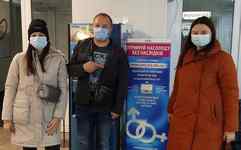 HIV tests and their satisfaction with the website services. The survey responses were analyzed and the results were part of the research “Oral HIV tests.” Besides, the bot helped to form a group for online testing of the LGBT community members. In total, 1,692 people took part in the online survey, which proves the efficiency of the online tools. In addition, the Telegram bot is used for online outreach or navigation, leading the clients to online consultations of friendly doctors, psychologists and lawyers.
HIV tests and their satisfaction with the website services. The survey responses were analyzed and the results were part of the research “Oral HIV tests.” Besides, the bot helped to form a group for online testing of the LGBT community members. In total, 1,692 people took part in the online survey, which proves the efficiency of the online tools. In addition, the Telegram bot is used for online outreach or navigation, leading the clients to online consultations of friendly doctors, psychologists and lawyers.
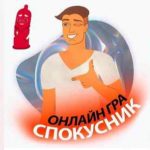 Another gem of the project is the Seducer simulation game for MSM. As we all know, there are no drafts in life, so it is important to make right decisions from the first time. Unfortunately, we do not always have time or experience to understand, which decision is right and what consequences it can lead to. Participants of the simulation game are able to put themselves in the shoes of the game heroes, try different scenarios, and see the consequences of their choices. The game is a very effective education tool. NGOs offer to use this tool in their workshops for MSM.
Another gem of the project is the Seducer simulation game for MSM. As we all know, there are no drafts in life, so it is important to make right decisions from the first time. Unfortunately, we do not always have time or experience to understand, which decision is right and what consequences it can lead to. Participants of the simulation game are able to put themselves in the shoes of the game heroes, try different scenarios, and see the consequences of their choices. The game is a very effective education tool. NGOs offer to use this tool in their workshops for MSM.
Vending machines were widely used to distribute oral tests. They allow clients to access HIV tests and do self-testing in a comfortable place. Also, there are free condoms available in the vending machines. The mechanism is quite easy: you go to the website, answer the questions, generate a QR code, scan it and get what you need. In one year, 1,107 oral HIV tests were distributed through such vending machines.
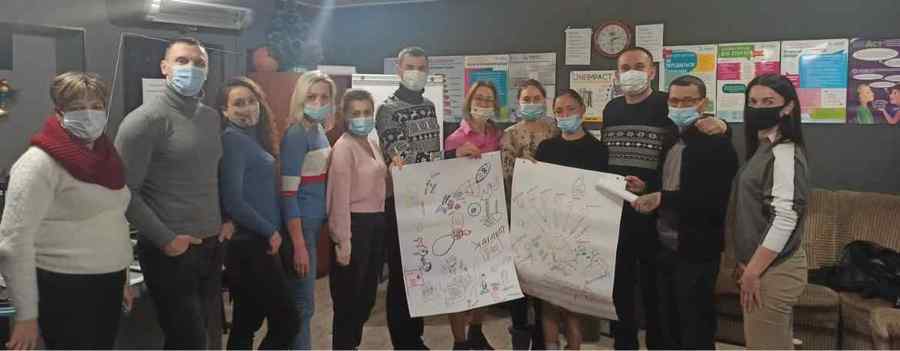 For successful project implementation, it is important not only to encourage new clients to get tested, but also care about motivation, awareness and support of the project staff. That is why supervision has been launched as an important project component to provide ongoing help and support to the NGO staff members and health workers engaged in the project. The key topics discussed at the supervision sessions:
For successful project implementation, it is important not only to encourage new clients to get tested, but also care about motivation, awareness and support of the project staff. That is why supervision has been launched as an important project component to provide ongoing help and support to the NGO staff members and health workers engaged in the project. The key topics discussed at the supervision sessions:
• peculiarities of HIV testing and counseling (in particular using a questionnaire to screen clients for risky behaviors and medical indications for testing);
• motivational counseling with skill building exercises (including index testing);
• prevention of professional burnout among the staff;
• maintaining emotional and psychological stability during hostilities, etc.
Both face-to-face and online sessions were organized. Due to the war, the number of face-to-face supervision sessions – both in NGOs and in health facilities – reduced greatly. However, despite all the challenges, supervisors were able to carry out 74 supervision sessions in NGOs and health facilities. The face-to-face supervision sessions were attended by 146 NGO representatives and 547 health workers, including nurses and doctors of different profiles, offering HIV and hepatitis testing and counseling. The number of online supervision sessions – both group and individual – was much bigger. In total, there were 1,434 online supervision sessions.
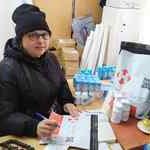 Providing support to the newly diagnosed patients was another focus of our work. When patients learn about their HIV-positive status, it is much easier for them to cope with the challenges and overcome the obstacles they face when they are supported by a mentor, who has a similar experience, which he is ready to share. One of the innovative approaches used in the project was peer mentoring. Mentors received special training on such topics as living with HIV, providing psychological support, coping with stress, offering motivational counseling to build adherence to ART, etc. After being trained, mentors were supporting their mentees living with HIV who had risks of dropping out of treatment and helped them build their lives with their new status. As for the mentors, it gave them a chance to do things which were socially important, build their capacity and self-esteem through training and cooperation with the project. This approach received a lot of positive feedback both from the mentors and from the mentees.
Providing support to the newly diagnosed patients was another focus of our work. When patients learn about their HIV-positive status, it is much easier for them to cope with the challenges and overcome the obstacles they face when they are supported by a mentor, who has a similar experience, which he is ready to share. One of the innovative approaches used in the project was peer mentoring. Mentors received special training on such topics as living with HIV, providing psychological support, coping with stress, offering motivational counseling to build adherence to ART, etc. After being trained, mentors were supporting their mentees living with HIV who had risks of dropping out of treatment and helped them build their lives with their new status. As for the mentors, it gave them a chance to do things which were socially important, build their capacity and self-esteem through training and cooperation with the project. This approach received a lot of positive feedback both from the mentors and from the mentees.
We would like to separately recognize the adaptability and creativity of our partner NGOs in finding new clients and interacting with them. Due to the war, many clients had to leave their homes and look for shelter in new places, where they sometimes did not have access to ART. That is why social workers organized the delivery of ARVs to their clients living with HIV, in particular internally displaced persons. In total, there were 233 ARV deliveries organized within the project.
Most NGOs started working with internally displaced persons and offering humanitarian support within other projects. Thus, they were able to reach a new target audience. Now, when people come to NGOs to get humanitarian aid, they also get information about HIV and are offered HIV testing. Such information is also distributed in the places where IDPs live.
The donor decided to extend the project for the sixth year, so we continue fighting HIV despite all the challenges we are facing today.
October 31, 2022
New Challenges – New Solutions! Fight Against HIV Continues During the War.

